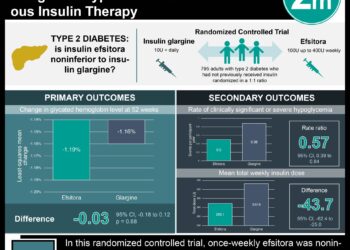Wellness Check: Spirituality
1. In this systematic review, several studies found that religious and spiritual practices positively influenced glycemic control in patients with type 2 diabetes (T2D).
2. However, 2 of the 8 included studies showed mixed results with respect to religious involvement and glycemic control.
Evidence Rating Level: 1 (Excellent)
The management of type 2 diabetes (T2D) involves maintaining optimal glycemic control to prevent serious complications. Religion and spirituality are important for patient wellbeing and may also be methods of managing their health. Currently, little is known with respect to the association between religion and spirituality, and physical health in patients with T2D. As a result, the objective of the present study was to review the literature on the role of spirituality and religion on the glycemic control of patients with T2D.
Of 761 identified records, 8 studies were included from various databases from 1966-2022. Studies were included if they investigated the effects of spirituality or religion on glycemic parameters in patients with T2D. Studies were excluded if they investigated qualitative lifestyle behaviors, psycho-social metrics, or culturally competent prevention/education programs related to diabetes self-management. The review was performed using PRISMA guidelines. The risk of bias was assessed using rating criteria developed by JAMA and the Oxford Centre for Evidence-Based Medicine. The primary outcome was glycemic control.
The results demonstrated that several studies found either a positive or positive-neutral association between religious or spiritual involvement and improved glucose control. However, 2 of the 8 included studies showed mixed results with both positive and negative associations. Despite these results, the study was limited by the heterogeneity and small sample sizes of the included studies which may have limited generalizability. Nonetheless, the present study presented initial evidence suggesting that religious and/or spiritual practices may positively affect glycemic control in some patients with T2D.
1. In this scoping review, mindfulness therapy improved the psychological wellbeing of students during the COVID-19 pandemic.
2. In addition, four main techniques in mindfulness therapy were identified: visual imagery, deep breathing, progressive muscle relaxation training, and self-talk.
Evidence Rating Level: 1 (Excellent)
During the COVID-19 pandemic, the mental wellbeing of students was significantly affected, in part due to changes in the learning environment. Mindfulness is thought to enhance emotional flexibility, which may mediate stress and anxiety. However, this link has not been extensively evaluated. As a result, the objective of the present study was to explore the impact of mindfulness interventions on the psychological wellbeing of adolescent students during the COVID-19 pandemic.
Of 2194 identified records, 10 (range 20-166 students) studies were included from various databases that were published during the COVID-19 pandemic (2019-2022). Studies were included if they had a randomized controlled trial or quasi-experimental study design and assessed the psychological wellbeing of students undergoing mindfulness interventions. The review was performed using PRISMA-ScR guidelines. Quality assessment was performed using the Joanna Briggs Institute (JBI) instrument. The primary outcome was psychological wellbeing.
The results demonstrated that mindfulness significantly improved the psychological wellbeing of students during the COVID-19 pandemic. In addition, several mental health markers improved following mindfulness interventions, such as anxiety, depression, stress, and emotional regulation. In addition, there were four main techniques in mindfulness therapy identified: visual imagery, deep breathing, progressive muscle relaxation, and self-talk. Despite these results, the study was limited by the short publication period, which prevented the assessment of mindfulness on psychological wellbeing prior to the COVID-19 pandemic. Nonetheless, the present study provided evidence to support the psychological benefits of mindfulness in students during the COVID-19 pandemic.
Spirituality and connectedness may improve loneliness at the end-of-life
1. In this scoping review, several factors predisposed adults to loneliness at the end-of life, including inadequate spiritual supports and withdrawal from social networks.
2. In addition, interventions facilitating spirituality, connectedness, and social interactions helped to alleviate loneliness.
Evidence Rating Level: 1 (Excellent)
Loneliness is an important concern clinically as it increases symptom burden in patients, especially at the end-of-life. Many situations that can precipitate loneliness, such as loss of social roles and fear of death, are common at the end-of-life. However, the impact of loneliness on the end-of-life experience has not been clearly explored. As a result, the objective of the present scoping review was to synthesize the available research on loneliness at the end-of-life in patients.
Of 5237 identified records, 23 (n=7540 participants) studies were included from various databases from January 2001 to July 2022. Studies were included if they investigated loneliness in adults who had a life-limiting or terminal illness. Studies were excluded if their focus was on social isolation with no distinction made for loneliness, or if participants were under the age of 18 years. The review was performed using PRISMA-ScR guidelines. The primary outcome was the factors associated with loneliness at the end of life.
The results demonstrated that factors such as withdrawal from social networks, an inability to share emotions, and inadequate spiritual supports contributed to feelings of loneliness. In addition, interventions that facilitated spirituality and connectedness were found to be effective in alleviating loneliness but were not studied in clinical trials. Despite these results, the study was limited by the absence of a quality assessment, which may have affected the strength of the results. Nonetheless, the present study suggested that social and spiritual supports may help alleviate loneliness in patients at the end-of-life.
Whole-person assessments may not yet be suitable for general practice
1. In this systematic review, there was no single multipurpose approach for performing a whole-person assessment (WPA) that was suitable for implementation in general practice.
2. However, some WPAs, such as the health status graph assessment, Personalized Health Planning, and the Patient Perspective Survey, were considered suitable for specific purposes.
Evidence Rating Level: 1 (Excellent)
Whole-person assessments (WPA) may be superior to single-disease models in evaluating patients. The scope of WPA is broad, and many have argued that better approaches are required before they are used in practice. Currently, no study has evaluated the applicability of the WPA framework to general practice. As a result, the objective of the present systematic review was to identify clinical approaches to WPA and to determine if there were approaches suitable for implementation into general practice.
Of 7535 identified records, 59 (n=42 WPA methods) studies were included from various databases from inception to March 2020. Studies were included if they were published in English, included WPAs used to assess biological, physical, emotional, or psychological contexts, and involved patient-clinician interactions. Studies were excluded if they focused on cross-cultural or single-disease validation of tools or if the WPA approach was longer than 1 hour in length. The review was performed using PRISMA guidelines. Quality assessment was performed using the Johanna Briggs Institutes’ Checklist and Terwee’s criteria for validation studies. The primary outcome was the suitability of WPAs for general practice.
The results demonstrated that there was no appropriate and validated multipurpose WPA that would be ideal for implementation in general practice. However, the health status graph assessment, Personalized Health Planning, and the Patient Perspective Survey were found to be useful in eliciting patient perspectives and facilitating patient care planning. Despite these results, the study was limited by the lack of Indigenous perspectives, which may have impacted the generalizability of the findings. Nonetheless, the present study was the first to assess the suitability of WPAs for general practice.
Image: PD
©2023 2 Minute Medicine, Inc. All rights reserved. No works may be reproduced without expressed written consent from 2 Minute Medicine, Inc. Inquire about licensing here. No article should be construed as medical advice and is not intended as such by the authors or by 2 Minute Medicine, Inc.









